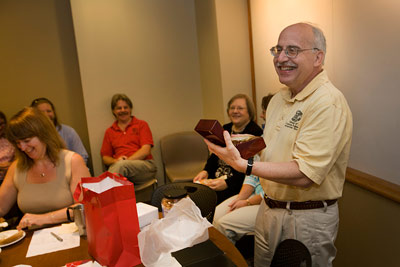Glenn Altschuler celebrates 20 energetic years as dean, but says teaching and advising come first
By Susan Kelley

"See those three guys?" said Glenn Altschuler, dean of the School of Continuing Education and Summer Sessions (SCE), pointing to photographs of former advisees. "Taking the time to have some small impact on undergraduates is a lot more important, in my view, than sitting in a meeting. It's more important than anything I've written or will write. It's the reason I got involved in academia."
Altschuler, who is celebrating 20 years as dean, accepted the job on the condition that he maintain his teaching and advising load. "And I've stuck with that."
It's unusual for a Cornell dean to stay two decades on the job. But, as Provost Kent Fuchs notes, Altschuler is "a visionary" who also brings to the table a sense of humor, a gift for precise language, and a valuable institutional memory. "Glenn's experience helps us shape the university's future based on that understanding of the past," he says.
Altschuler is also a man of protean energies. He's the Thomas and Dorothy Litwin Professor of American Studies, a faculty fellow at Hans Bethe House, and vice president for university relations, a job he has held since 2009. In addition, he is a prolific author, and his reviews of books appear regularly in the popular media.
The university recognized his "sustained record of effective, inspiring and distinguished teaching of undergraduate students" in 2006 with a Stephen H. Weiss Presidential Fellowship; he is also the winner of the Clark Teaching Award, the Donna and Robert Paul Award for Excellence in Faculty Advising, and the Kendall S. Carpenter Memorial Award for Outstanding Advising.
Students recognize his contributions, too. "You have instilled a sense of confidence in me that has transformed my life," said Pat Burns '09, at the 2008 dedication of Appel Commons' second-floor terrace named in Altschuler's honor. "My life, in no small measure, has been marked by the relationship and bond I have with you," Burns said.
While Altschuler's commitment to teaching and advising hasn't changed since he became dean, SCE has.
Twenty years ago, SCE was known as the Division of Summer Session, Extramural Study and Related Programs. Summer Session staff made do in a trailer outside the Engineering Quad, while other division staff huddled in the basement of Ives Hall, Altschuler remembers. The division became a school in 1992 and moved its offices into Day Hall a few years later.
SCE offers academically rigorous courses for non-degree students, young and old, as well as for undergraduates. While the school doesn't have its own faculty or degree matriculants, it generates revenue for the provost's general purpose fund. On that score, despite the dismal economy, the 2010-11 academic year was SCE's best yet.
SCE has continued to flourish by anticipating the needs of a wide array of students, Altschuler says. It was early in the game to offer courses for rising high school juniors; in recent years, it has recruited teens from China. The school invented courses for undergraduates who wanted work experience: Among others, SCE courses on the financial industry and the law include internships in New York City. SCE also developed distance learning courses, so that students could take a course in a summer or winter session while working in, say, Singapore. New initiatives for professionals include a post-baccalaureate program in health studies, and a finance course for non-financial managers. "We've been very nimble. Twenty years ago, a lot of this stuff didn't exist," says Altschuler.
He's modest in attributing his longevity as dean to superb colleagues. "I bring new meaning to the word 'figurehead,'" Altschuler says. He notes as well that he does not have what he calls "the crushing responsibilities" of deans of schools with faculty and degree matriculants. He's economical with his time, declining to attend meetings he considers unimportant. He delegates widely, doesn't keep extensive records, and admits to being "ruthlessly disciplined" about his top priority: students.
"Long after everybody forgets that I was dean, I hope somebody will remember that I had a little something to do with helping at a critical moment," he says.
On this particular day, he spends a few extra minutes talking to a visitor, but not much more. Outside his office, a student is waiting.
Media Contact
Get Cornell news delivered right to your inbox.
Subscribe